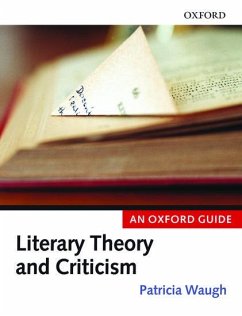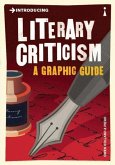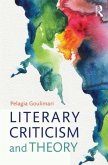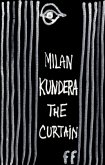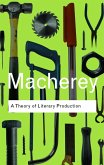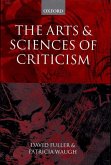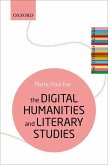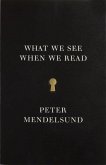- Broschiertes Buch
- Merkliste
- Auf die Merkliste
- Bewerten Bewerten
- Teilen
- Produkt teilen
- Produkterinnerung
- Produkterinnerung
Serving as a guide to literary theory and criticism, this title, divided into four parts, covers the philosophical and aesthetic origins of literary theory. It looks at the foundational movements and thinkers in the first half of the twentieth century, and offers introductory overviews of the important movements and thinkers in literary theory.
Andere Kunden interessierten sich auch für
![Introducing Literary Criticism Introducing Literary Criticism]() Owen HollandIntroducing Literary Criticism16,99 €
Owen HollandIntroducing Literary Criticism16,99 €![Literary Criticism and Theory Literary Criticism and Theory]() Pelagia GoulimariLiterary Criticism and Theory58,99 €
Pelagia GoulimariLiterary Criticism and Theory58,99 €![The Curtain The Curtain]() Milan KunderaThe Curtain22,99 €
Milan KunderaThe Curtain22,99 €![A Theory of Literary Production A Theory of Literary Production]() Pierre MachereyA Theory of Literary Production26,99 €
Pierre MachereyA Theory of Literary Production26,99 €![The Arts and Sciences of Criticism The Arts and Sciences of Criticism]() David Fuller / Patricia Waugh (eds.)The Arts and Sciences of Criticism69,99 €
David Fuller / Patricia Waugh (eds.)The Arts and Sciences of Criticism69,99 €![The Digital Humanities and Literary Studies The Digital Humanities and Literary Studies]() Martin Paul Eve (Technology Professor of Literature and PublishingThe Digital Humanities and Literary Studies29,99 €
Martin Paul Eve (Technology Professor of Literature and PublishingThe Digital Humanities and Literary Studies29,99 €![What We See When We Read What We See When We Read]() Peter MendelsundWhat We See When We Read14,99 €
Peter MendelsundWhat We See When We Read14,99 €-
-
-
Serving as a guide to literary theory and criticism, this title, divided into four parts, covers the philosophical and aesthetic origins of literary theory. It looks at the foundational movements and thinkers in the first half of the twentieth century, and offers introductory overviews of the important movements and thinkers in literary theory.
Hinweis: Dieser Artikel kann nur an eine deutsche Lieferadresse ausgeliefert werden.
Hinweis: Dieser Artikel kann nur an eine deutsche Lieferadresse ausgeliefert werden.
Produktdetails
- Produktdetails
- Verlag: Oxford University Press
- Seitenzahl: 620
- Erscheinungstermin: 26. Januar 2006
- Englisch
- Abmessung: 247mm x 187mm x 42mm
- Gewicht: 1145g
- ISBN-13: 9780199258369
- ISBN-10: 0199258368
- Artikelnr.: 13045137
- Herstellerkennzeichnung
- Libri GmbH
- Europaallee 1
- 36244 Bad Hersfeld
- gpsr@libri.de
- Verlag: Oxford University Press
- Seitenzahl: 620
- Erscheinungstermin: 26. Januar 2006
- Englisch
- Abmessung: 247mm x 187mm x 42mm
- Gewicht: 1145g
- ISBN-13: 9780199258369
- ISBN-10: 0199258368
- Artikelnr.: 13045137
- Herstellerkennzeichnung
- Libri GmbH
- Europaallee 1
- 36244 Bad Hersfeld
- gpsr@libri.de
Patricia Waugh has published extensively in the field of modern fiction and criticism. She is the author of The Harvest of the Sixties: English Literature and its Backgrounds (1995) and Revolutions of the Word: Intellectual Contexts for the Study of Modern Literature (1997). She has also edited a number of collections and anthologies of modern literary theory, postmodernism, and most recently, The Arts and Sciences of Criticism (with David Fuller).
* Introduction: criticism, theory, and anti-theory
* Part I Concepts of criticism and aesthetic origins
* 1: Ann Nightingale: Mimesis: ancient Greek literary theory
* 2: Andrew Bennett: Expressivity: the Romantic theory of authorship
* 3: Timothy Clark: Interpretation: hermeneutics
* 4: Patricia Waugh: Value: criticism, canons, and evaluation
* Part II Criticism and critical practices in the twentieth century
* 5: Chris Baldick: Literature and the academy
* 6: Ann Banfield: I. A. Richards
* 7: Gareth Reeves: T. S. Eliot and the idea of tradition
* 8: Michael Bell: Anthropology, myth, and modern criticism
* 9: Gary Day: F. R. Leavis: criticism and culture
* 10: Tony Davies: Marxist aesthetics
* 11: David Fuller: William Empson: from verbal analysis to cultural
criticism
* 12: Stephen Matterson: The New Criticism
* 13: Peter Lamarque: The intentional fallacy
* 14: Andrew Bowie: Adorno and the Frankfurt School
* 15: Celine Surprenant: Freud and psychoanalysis
* 16: Gary Saul Morson: The Russian debate on narrative
* 17: Lynne Pearce: Bakhtin and dialogics
* 18: Faiza W. Shereen: Form, rhetoric, and intellectual history
* 19: Glenn Jordan and Chris Weedon: Literature into culture: cultural
studies after Leavis
* Part III Literary theory: movements and schools
* 20: Susana Onega: Structuralism and narrative poetics
* 21: Josiane Paccaud-Huguet: Psychoanalysis after Freud
* 22: Alex Thompson: Deconstruction
* 23: Fiona Tolann: Feminisms
* 24: Elleke Boehmer: Postcolonialism
* 25: Kathleen Kerr: Race, nation, and ethnicity
* 26: Paul Hamilton: Reconstructing historicism
* 27: Chris Snipp-Walmsley: Postmodernism
* 28: Tony Purvis: Sexualities
* 29: Christopher Norris: Science and criticism: beyond the culture
wars
* Part IV Futures and retrospects
* 30: K. M. Newton: Performing literary interpretation
* 31: Sean Burke: The responsibilities of the writer
* 32: Roger Luckhurst: Mixing memory and desire: psychoanalysis,
psychology, and trauma theory
* 33: Jeremy Hawthorn: Theories of the gaze
* 34: David Punter: Anti-canon theory
* 35: Richard Kerridge: Environmentalism and ecocriticism
* 36: Alan Richardson: Cognitive literary criticism
* 37: Scott Wilson: Writing excess: the poetic principle of
post-literary culture
* Index
* Part I Concepts of criticism and aesthetic origins
* 1: Ann Nightingale: Mimesis: ancient Greek literary theory
* 2: Andrew Bennett: Expressivity: the Romantic theory of authorship
* 3: Timothy Clark: Interpretation: hermeneutics
* 4: Patricia Waugh: Value: criticism, canons, and evaluation
* Part II Criticism and critical practices in the twentieth century
* 5: Chris Baldick: Literature and the academy
* 6: Ann Banfield: I. A. Richards
* 7: Gareth Reeves: T. S. Eliot and the idea of tradition
* 8: Michael Bell: Anthropology, myth, and modern criticism
* 9: Gary Day: F. R. Leavis: criticism and culture
* 10: Tony Davies: Marxist aesthetics
* 11: David Fuller: William Empson: from verbal analysis to cultural
criticism
* 12: Stephen Matterson: The New Criticism
* 13: Peter Lamarque: The intentional fallacy
* 14: Andrew Bowie: Adorno and the Frankfurt School
* 15: Celine Surprenant: Freud and psychoanalysis
* 16: Gary Saul Morson: The Russian debate on narrative
* 17: Lynne Pearce: Bakhtin and dialogics
* 18: Faiza W. Shereen: Form, rhetoric, and intellectual history
* 19: Glenn Jordan and Chris Weedon: Literature into culture: cultural
studies after Leavis
* Part III Literary theory: movements and schools
* 20: Susana Onega: Structuralism and narrative poetics
* 21: Josiane Paccaud-Huguet: Psychoanalysis after Freud
* 22: Alex Thompson: Deconstruction
* 23: Fiona Tolann: Feminisms
* 24: Elleke Boehmer: Postcolonialism
* 25: Kathleen Kerr: Race, nation, and ethnicity
* 26: Paul Hamilton: Reconstructing historicism
* 27: Chris Snipp-Walmsley: Postmodernism
* 28: Tony Purvis: Sexualities
* 29: Christopher Norris: Science and criticism: beyond the culture
wars
* Part IV Futures and retrospects
* 30: K. M. Newton: Performing literary interpretation
* 31: Sean Burke: The responsibilities of the writer
* 32: Roger Luckhurst: Mixing memory and desire: psychoanalysis,
psychology, and trauma theory
* 33: Jeremy Hawthorn: Theories of the gaze
* 34: David Punter: Anti-canon theory
* 35: Richard Kerridge: Environmentalism and ecocriticism
* 36: Alan Richardson: Cognitive literary criticism
* 37: Scott Wilson: Writing excess: the poetic principle of
post-literary culture
* Index
* Introduction: criticism, theory, and anti-theory
* Part I Concepts of criticism and aesthetic origins
* 1: Ann Nightingale: Mimesis: ancient Greek literary theory
* 2: Andrew Bennett: Expressivity: the Romantic theory of authorship
* 3: Timothy Clark: Interpretation: hermeneutics
* 4: Patricia Waugh: Value: criticism, canons, and evaluation
* Part II Criticism and critical practices in the twentieth century
* 5: Chris Baldick: Literature and the academy
* 6: Ann Banfield: I. A. Richards
* 7: Gareth Reeves: T. S. Eliot and the idea of tradition
* 8: Michael Bell: Anthropology, myth, and modern criticism
* 9: Gary Day: F. R. Leavis: criticism and culture
* 10: Tony Davies: Marxist aesthetics
* 11: David Fuller: William Empson: from verbal analysis to cultural
criticism
* 12: Stephen Matterson: The New Criticism
* 13: Peter Lamarque: The intentional fallacy
* 14: Andrew Bowie: Adorno and the Frankfurt School
* 15: Celine Surprenant: Freud and psychoanalysis
* 16: Gary Saul Morson: The Russian debate on narrative
* 17: Lynne Pearce: Bakhtin and dialogics
* 18: Faiza W. Shereen: Form, rhetoric, and intellectual history
* 19: Glenn Jordan and Chris Weedon: Literature into culture: cultural
studies after Leavis
* Part III Literary theory: movements and schools
* 20: Susana Onega: Structuralism and narrative poetics
* 21: Josiane Paccaud-Huguet: Psychoanalysis after Freud
* 22: Alex Thompson: Deconstruction
* 23: Fiona Tolann: Feminisms
* 24: Elleke Boehmer: Postcolonialism
* 25: Kathleen Kerr: Race, nation, and ethnicity
* 26: Paul Hamilton: Reconstructing historicism
* 27: Chris Snipp-Walmsley: Postmodernism
* 28: Tony Purvis: Sexualities
* 29: Christopher Norris: Science and criticism: beyond the culture
wars
* Part IV Futures and retrospects
* 30: K. M. Newton: Performing literary interpretation
* 31: Sean Burke: The responsibilities of the writer
* 32: Roger Luckhurst: Mixing memory and desire: psychoanalysis,
psychology, and trauma theory
* 33: Jeremy Hawthorn: Theories of the gaze
* 34: David Punter: Anti-canon theory
* 35: Richard Kerridge: Environmentalism and ecocriticism
* 36: Alan Richardson: Cognitive literary criticism
* 37: Scott Wilson: Writing excess: the poetic principle of
post-literary culture
* Index
* Part I Concepts of criticism and aesthetic origins
* 1: Ann Nightingale: Mimesis: ancient Greek literary theory
* 2: Andrew Bennett: Expressivity: the Romantic theory of authorship
* 3: Timothy Clark: Interpretation: hermeneutics
* 4: Patricia Waugh: Value: criticism, canons, and evaluation
* Part II Criticism and critical practices in the twentieth century
* 5: Chris Baldick: Literature and the academy
* 6: Ann Banfield: I. A. Richards
* 7: Gareth Reeves: T. S. Eliot and the idea of tradition
* 8: Michael Bell: Anthropology, myth, and modern criticism
* 9: Gary Day: F. R. Leavis: criticism and culture
* 10: Tony Davies: Marxist aesthetics
* 11: David Fuller: William Empson: from verbal analysis to cultural
criticism
* 12: Stephen Matterson: The New Criticism
* 13: Peter Lamarque: The intentional fallacy
* 14: Andrew Bowie: Adorno and the Frankfurt School
* 15: Celine Surprenant: Freud and psychoanalysis
* 16: Gary Saul Morson: The Russian debate on narrative
* 17: Lynne Pearce: Bakhtin and dialogics
* 18: Faiza W. Shereen: Form, rhetoric, and intellectual history
* 19: Glenn Jordan and Chris Weedon: Literature into culture: cultural
studies after Leavis
* Part III Literary theory: movements and schools
* 20: Susana Onega: Structuralism and narrative poetics
* 21: Josiane Paccaud-Huguet: Psychoanalysis after Freud
* 22: Alex Thompson: Deconstruction
* 23: Fiona Tolann: Feminisms
* 24: Elleke Boehmer: Postcolonialism
* 25: Kathleen Kerr: Race, nation, and ethnicity
* 26: Paul Hamilton: Reconstructing historicism
* 27: Chris Snipp-Walmsley: Postmodernism
* 28: Tony Purvis: Sexualities
* 29: Christopher Norris: Science and criticism: beyond the culture
wars
* Part IV Futures and retrospects
* 30: K. M. Newton: Performing literary interpretation
* 31: Sean Burke: The responsibilities of the writer
* 32: Roger Luckhurst: Mixing memory and desire: psychoanalysis,
psychology, and trauma theory
* 33: Jeremy Hawthorn: Theories of the gaze
* 34: David Punter: Anti-canon theory
* 35: Richard Kerridge: Environmentalism and ecocriticism
* 36: Alan Richardson: Cognitive literary criticism
* 37: Scott Wilson: Writing excess: the poetic principle of
post-literary culture
* Index

